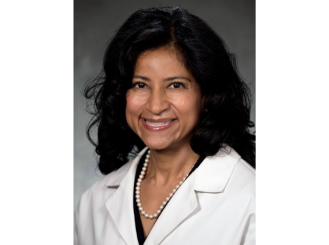Apr 11, 2023
The 2023 Excellence in Equity Award Will Be Presented to Dr. Guerra
By Brandon May
ASCO will honor Carmen Guerra, MD, MSCE, FACP, the Ruth C. and Raymond G. Perelman Professor of Medicine and the vice chair of diversity and inclusion for the Department of Medicine at the Perelman School of Medicine of the University of Pennsylvania, with the Excellence in Equity Award for her persistent work to advance equitable access to cancer clinical trials, cancer screenings, and care. The award will be presented during the 2023 ASCO Annual Meeting on June 4.
Dr. Guerra said she was overwhelmed with emotion upon hearing that she was selected to receive the award, particularly given that this news was delivered by a prominent figure in the field who has long pushed for greater equity in oncology.
“My initial feelings were of overwhelming honor and joy,” she said, “especially because the call about the award came from Dr. Lori Pierce, a trailblazer [and] giant in the field of health equity and someone who I greatly look up to.”
In a statement of appreciation, Dr. Guerra noted that Dr. Pierce, a past president of ASCO, as well as Dr. Randall Oyer, a past president of the Association of Community Cancer Centers, have been the biggest supporters and generous sponsors of her work in diversity, equity, and inclusion.
“They were led to me by the Abramson Cancer Center [of the University of Pennsylvania] Director Dr. Robert Vonderheide, who perhaps has been one of the biggest champions in my career,” Dr. Guerra added. “His commitment to diversity, inclusion, and equity is profound, and he has elevated the value of the health equity research at our center.”
Dr. Guerra also expressed gratitude toward ASCO, the Association of Community Cancer Centers, the Patient Partners Advisory Group, and a national workgroup of cancer equity experts that she “was honored to co-chair with Dr. Nadine Barrett and Dr. Alice Pressman.” Overall, these organized groups of experts have enabled the development of “new tools to help us all advance diversity, equity, and inclusion in cancer clinical trials.”
A Rewarding Journey
The University of Pennsylvania is in West Philadelphia, which Dr. Guerra noted as a region of the city where approximately 75% of the population self-identifies as either Black or African American.
“During the initial years of my career as a primary care physician in West Philadelphia, I began to see the racial disparities in cancer incidence and mortality [and] I also saw disparities in access to cancer screenings tests,” she said.
As she cared for this population, Dr. Guerra quickly realized that access to health insurance, a primary care physician, and even an order for a cancer screening test were not sufficient.
“I began to study the barriers to accessing cancer screenings,” she said, “and that led to additional research that allowed me to develop and evaluate navigation programs for colorectal cancer screening and then breast cancer screening.”
These programs were successful and have provided access to cancer screening tests to more than 6,000 people who had previously not had access to these screenings, Dr. Guerra said.
“Over 100 individuals have [also] been found to have early-stage cancers through these programs,” she added.
According to Dr. Guerra, the development of the patient navigation programs represented one of the proudest moments of her career. During this time, the Abramson Cancer Center invited her to help engage diverse populations in cancer clinical trials. She and her colleagues developed community outreach and engagement strategies as well as institutional practices that doubled the proportion of Black patients in cancer treatment trials.
A more recent accomplishment cherished by Dr. Guerra has been her work on developing community-based strategies for cancer screenings, including drive-through Flu-FIT clinics, in partnership with faith-based institutions.
She noted that these strategies have virtually eliminated barriers to accessing cancer screenings for thousands of people in the community and have allowed her and her team to identify cancers during their most treatable and less devastating stages. “It was truly a team effort by so many individuals including many community leaders and partners,” she said, “and I am proud of our team.”
Current State of Equitable Oncology Practice
While Dr. Guerra is the first to mention that several inequalities remain in the practice of oncology as well as the composition of its workforce, she pointed to some important achievements in recent years related to the issue of diverse representation in clinical trials. Specifically, several changes at the policy level have been made to remedy this complex issue.
For instance, as Dr. Guerra and colleagues wrote in a 2021 paper, in January 2022 Medicaid started to cover routine costs associated with clinical trials, helping to pave the way for more equitable access to cancer trials.1
“Previously, some states did not allow for Medicaid coverage of these costs because these were considered ‘experimental,’” she explained. “Furthermore, several states, including my own state of Pennsylvania, have passed laws to explicitly state that reimbursement of clinical trial-related out-of-pocket expenses, which inequitably burden low-income populations and restrict access to clinical trials, is not undue influence or coercion.”
She explained that this measure is critically important because industry sponsors do not always provide reimbursement for out-of-pocket costs, such as transportation and lodging, out of concerns about exerting this “undue influence” on clinical trial participants.
“One of the biggest gaps that I would like to see closed in the coming years in oncology is the limited diversity of its workforce,” Dr. Guerra concluded. “ASCO has developed new programs such as the Oncology Summer Internship and a student interest group, as well as other programs, but we will need new partnerships, resources, investment, and leadership to accomplish significant change.”
Reference
- Takvorian SU, Guerra CE, Schpero WL. A Hidden Opportunity - Medicaid's Role in Supporting Equitable Access to Clinical Trials. N Engl J Med. 2021;384(21):1975-1978. https://doi.org/10.1056/NEJMp2101627.PubMed. Epub 2021 May 22.

